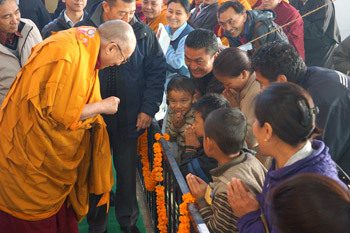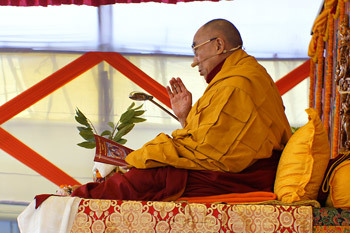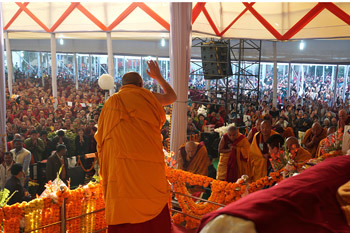Sarnath, Uttar Pradesh, India, 10 January 2013 - The weather was milder and the sky was blue for the first time in the morning since he arrived in Sarnath, as His Holiness the Dalai Lama made his way early to the teaching pavilion. He spent an hour performing the preparatory rites for the Avalokiteshvara empowerment he was going to give. Following the recitation of the Mangala Sutta in Pali, the Heart Sutra was recited in Russian.

|
| His Holiness the Dalai Lama greeting young Tibetans as he arrives for the final day of his teachings in Sarnath, Uttar Pradesh, India, on January 10, 2013. Photo/Jeremy Russell/OHHDL |
“Today, here in this sacred place, is the last day of the teachings,” he said. “Vasubhandu has divided the Buddha’s teaching into the scriptural and the experiential. And we’ll be able to preserve it if we engage in study and practice, which involves hearing the teaching explained and thinking it over again and again, then meditating on what you’ve understood.”
He repeated that study and practice is the only way to preserve the Buddha’s teachings. Constructing monasteries and erecting statues have their place, but if that is all we do, we won’t be able to preserve the tradition; we need to study and practice.
“We do not pay much respect to the Kangyur and Tengyur collections other than treating them as objects of veneration. We have no custom of opening the volumes and simply reading them. Study should not be the preserve of the monastics. Lay people, both men and women must study and come to understand the Dharma. What we are dealing with is a system of mind and how to cultivate happiness in relation to it.”
His Holiness suggested that we receive teachings from masters to overcome our doubts. Then we have to investigate whether the teachings stand up to reasoned examination. We need to take a critical approach. Some texts are regarded as provisional, while others are definitive. It’s worth remembering that the Buddha himself encouraged his followers not to take his teaching on trust but to investigate it thoroughly.
In the 8th century, Shantarakshita, Padmasambhava and King Trisong Deutsan began the monastic tradition in Tibet. A clear distinction was made between the monks in saffron robes and the tantrikas in white robes. These days however, the difference has become unclear. We see people who look like monastics, who dress in monastic robes, while they are in fact householders. To wear the monastic robes but not to remain celibate is a disgrace.
His Holiness continued,

|
| His Holiness the Dalai Lama speaking during the final day of his teachings in Sarnath, Uttar Pradesh, India, on January 10, 2013. Photo/Jeremy Russell/OHHDL |
“Today, I’m going to give an empowerment of Avalokiteshvara belonging to the lotus lineage, bearing in mind that Tibetans have a special connection with him. When Atisha composed the Lamp to the Path to Enlightenment in Tibet in the eleventh century, he mentioned the practice of tantra and he evidently followed it himself.”
Tantra employs different methods for acquiring the four bodies of a Buddha. It is called secret mantra, because it is not to be revealed to those who are unready for it, while mantra refers to a mind protector, something that protects the mind from ordinary appearances. Meanwhile the word vajra, in this context, means the indestructible inseparability of method and wisdom.
As a preliminary to the empowerment, His Holiness first gave the vows of a lay person, and then he conducted a ceremony to generate the aspiring awakening mind, followed by the bodhisattva vows. The Avalokiteshvara empowerment came from the tradition of the Bhikshuni Laxmi. Once that was complete, a ceremony, led by the Jangtse Choje, Lobsang Tenzin, was offered praying for His Holiness’s long life to which he responded,
“For as long as I am able to serve, I aspire to live long.”
After lunch, His Holiness wanted to complete his reading of the Guide to the Bodhisattva’s Way of Life. Only Chapter Nine on Wisdom and Chapter Ten concerning Dedication remained. In connection with wisdom, he quoted Nagarjuna,
“As long as there is grasping at the self-existence of the psycho-physical aggregates, understanding of the selflessness of persons will be incomplete.”
In the course of his reading he compared the yogis referred to in the text as comparable to today’s scientists. While he has met some who have been somewhat conservative and set in their views, most good scientists are broad-minded, forward looking and open to change.

|
| His Holiness the Dalai Lama waves to the audience at the conclusion of his teaching in Sarnath, Uttar Pradesh, India, on January 10, 2013. Photo/Jeremy Russell/OHHDL |
When he reached the end of the text, he returned to the beginning and read the first page again for auspicious reasons, saying,
“We have finished this Guide to the Bodhisattva’s Way of Life. This has been like the teachings that I usually give in the spring. From today those of you who have come from elsewhere will disperse and go your own ways. Make an effort to bring your mind closer and closer to what is taught in this book. Remember the vows you have taken and the promise you made during the empowerment to meditate daily on the awakening mind of bodhichitta and the view of emptiness. If you want to generate the aspiring and engaging awakening mind at home, you can read Chapter Two and Chapter Three up to verse 23 as the preliminary Seven Limb Practice. That way you can make your life meaningful.”
A public announcement was made about the financing of the event, stating what had been donated and what had been spent, and that the remainder would be given to local charities, particularly to support a local school for the visually challenged.
These were His Holiness’s parting words:
“Let’s dedicate our merit to the long life of our Lamas, to peace and harmony in the world at large and specifically to peace and freedom in Tibet. Tibetans in Tibet face such hardship right now, but their spirit remains strong. As we say in the Prayer of the Words of Truth - may they be guarded by the compassion of the Protector of the Potala. Thank you.”















